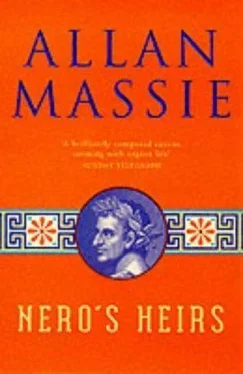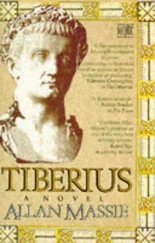Allan Massie - Nero_s Heirs
Здесь есть возможность читать онлайн «Allan Massie - Nero_s Heirs» весь текст электронной книги совершенно бесплатно (целиком полную версию без сокращений). В некоторых случаях можно слушать аудио, скачать через торрент в формате fb2 и присутствует краткое содержание. Жанр: Исторические приключения, на английском языке. Описание произведения, (предисловие) а так же отзывы посетителей доступны на портале библиотеки ЛибКат.
- Название:Nero_s Heirs
- Автор:
- Жанр:
- Год:неизвестен
- ISBN:нет данных
- Рейтинг книги:3 / 5. Голосов: 1
-
Избранное:Добавить в избранное
- Отзывы:
-
Ваша оценка:
- 60
- 1
- 2
- 3
- 4
- 5
Nero_s Heirs: краткое содержание, описание и аннотация
Предлагаем к чтению аннотацию, описание, краткое содержание или предисловие (зависит от того, что написал сам автор книги «Nero_s Heirs»). Если вы не нашли необходимую информацию о книге — напишите в комментариях, мы постараемся отыскать её.
Nero_s Heirs — читать онлайн бесплатно полную книгу (весь текст) целиком
Ниже представлен текст книги, разбитый по страницам. Система сохранения места последней прочитанной страницы, позволяет с удобством читать онлайн бесплатно книгу «Nero_s Heirs», без необходимости каждый раз заново искать на чём Вы остановились. Поставьте закладку, и сможете в любой момент перейти на страницу, на которой закончили чтение.
Интервал:
Закладка:
But, if Vitellius himself refused to look reality in the face, his partisans were alarmed by the rumours which his denial could not still. Thinking only of revenge, they sought out those who were believed to be traitors – though in the state of Rome then there could, honour being dead, be neither treachery nor true loyalty. Many innocent men, guilty of nothing but hope for a better future, were seized and put to death, or cut down casually in the streets. Flavius Sabinus himself dared not go abroad without an escort from the City Guard, and had doubts concerning their loyalty, though their mouths were stuffed with gold and their spirits raised with lavish promises of future bounty.
He frequently expressed anxiety concerning Domitian's safety, and could not trust my assurance that I had taken care of that. Yet he had no choice but to rely on my measures. He did not dare to keep the boy with him, for he knew that his own life was in danger every day, every hour, and that if he was arrested or cut down, then Domitian would be too. I assured him that the student friend with whom he was lodged kept the house himself and would not permit Domitian to venture forth. He scratched his head, and muttered that he hoped it was for the best, and confessed that he could think of no better plan.
'I dare not send him out of the city,' he said, 'for the Guards have set up road blocks and are interrogating every traveller. And I could not trust Domitian not to give himself away. If he survives, my brother will be eternally grateful to you. I'll see to it that he knows it is your work, for I am persuaded Domitian will never admit so much himself.'
I might, I suppose, have taken offence at his care for Domitian's safety and lack of concern for mine. But his indifference was venial: I was not his brother's son; I could take my chance.
Vitellius roused himself, or was roused by others. He entrusted the command of the Praetorians to his brother Lucius, no better in morals, but more energetic in manner. In what may have been intended as a gesture expressive of confidence, he even anticipated the elections, and nominated Consuls and other officers for several years in advance. He granted treaties, which he had no means of enforcing, to allies, and the rights of citizenship to provincials who could not enjoy them. He remitted tribute and even taxes. So, careless of the future, he scattered the resources of the Empire – all to win the plaudits of the mob, always impressed by the appearance of generosity. Some fools even purchased honours and offices, as if the prodigality of his gesture offered assurance of the permanence of his rule.
Then yielding to the demands of the soldiers, he even ventured into the camp. There, some (as I have heard) were dismayed by evil omens: a bull, for example, escaped from the place of sacrifice. Others, more perceptive or with a truer sense of reality, were still more dismayed by the conduct of their Emperor. For everything he said displayed his complete ignorance of warfare; he even had to enquire about how reconnaissance was carried out. Some said he didn't know the meaning of the word. Nor was his habitual drunkenness or the alarm he showed at every fresh piece of bad news likely to raise the morale of his troops. At last, having learned that the fleet stationed at Misenum had defected to the enemy, he abandoned the camp and returned to Rome. His brief impersonation of a commander had done him more damage even than his habitual indolence. Meanwhile, in the north, the fortunes of war tilted still more heavily against him. You will, Tacitus, from your other researches, and by means of further enquiries of any officers who took part in the campaign and who still survive, learn its details more accurately than you could from me. Afterwards I heard many tales of individual courage and prowess, and discounted most of them. I do not envy you your task of separating the grain of truth from the chaff of lies. To which sentiment I would merely add that my own experience of war, which, as you know, is considerable, has disposed me to believe that centurions and legionaries know only what happens within a few yards of their own position, and generals know less.
XXXVI
I hasten, Tacitus, mindful of your importunity, to bring my narrative to a conclusion; and I shall be happy to be rid of it.
Flavius Sabinus sent messengers to find me at the address I had left with him, and asked me to fetch Domitian. No doubt I looked surprised. But he smiled and said, 'It's all right. It's all over, or on the point of being all over. For some days Vitellius has, I'm told, been so deep sunk in lethargy, and so near despair, that he would have forgotten he is Emperor if those around him had not reminded him. To his considerable dismay, I might add. Now he has called me to a conference, and wishes to make terms. I think it will be valuable if I am able to have Domitian by my side. And you, too, of course.'
I have often wondered why he desired our presence. My conclusion is that he wanted us there as witnesses, to be able to inform Vespasian and Titus that he had behaved honourably, and had engaged in no sort of deception, or promotion of his own interests rather than theirs. Such was the trust between members of that family!
There were, indeed, those who were urging Flavius Sabinus to act on his own account. 'The merit of having finished the war,' they said, 'will belong to whichever man is in possession of Rome itself. Why should you not be Emperor rather than your brother, or why should you not share the Empire with him? At any rate, the glory of final victory will be yours, and that is something worth seeking.'
Flavius Sabinus proved that he was indeed worthy of Empire by rejecting the temptation dangled before him. He had given his word to his brother, and would keep it. Some of his friends found this incredible. They had forgotten the meaning of a man's word.
So I fetched Domitian, who was suspicious of the invitation, and of my intentions. He would indeed have declined to accompany me, if Aulus Pettius had not broken out in tones of contempt, and told him roundly that he could either go with me, or be thrown into the street and left to shift for himself.
'As for me,' he said, 'I have had my bellyful of your moaning, your self-pity and suspicions. I took you in only because our friend here begged me to do so, and not for any love of you. I'll thank you only to be gone. I'd rather see your back departing than your face for another hour.'
It was December. The year which had seen more Emperors than the previous fifty was drawing to a close. The day was dark and gloomy, bitter cold, with the north wind blowing hard from the mountains, blowing, as someone remarked, Vespasian's troops towards the capital and Vitellius to oblivion. The meeting was held in the Temple of Apollo. Flavius Sabinus was already there. He showed neither impatience nor any excitement, though the game that he had played with such courage in the midst of danger was drawing to a triumphant close. He embraced Domitian who winced. 'It's all over,' his uncle said, 'bar the shouting.'
Vitellius arrived late with his brother, a small staff of officers, and an escort from the Guard. All but three were commanded to wait without. His eyes were bloodshot and his speech thick, but he was only a little drunk, though his breath suggested he had followed last night's potations with what the Germans call 'the hair of the dog'.
Flavius Sabinus, ever the gentleman, began by commiserating with Vitellius on the death, a few days previously, of his aged mother. He mumbled a few incomprehensible words in reply. His hand shook, and he asked for wine. I believe Flavius Sabinus had determined to offer none, judging that Vitellius would be brought more quickly to an agreement if he was deprived of a drink: indeed I think that he would then have agreed to anything and everything merely to be free of the meeting and able to indulge himself. But, seeing his pitiable condition, Flavius Sabinus clapped his hands and commanded a slave to fetch wine. There was silence till Vitellius had a cup in his hand.
Читать дальшеИнтервал:
Закладка:
Похожие книги на «Nero_s Heirs»
Представляем Вашему вниманию похожие книги на «Nero_s Heirs» списком для выбора. Мы отобрали схожую по названию и смыслу литературу в надежде предоставить читателям больше вариантов отыскать новые, интересные, ещё непрочитанные произведения.
Обсуждение, отзывы о книге «Nero_s Heirs» и просто собственные мнения читателей. Оставьте ваши комментарии, напишите, что Вы думаете о произведении, его смысле или главных героях. Укажите что конкретно понравилось, а что нет, и почему Вы так считаете.












